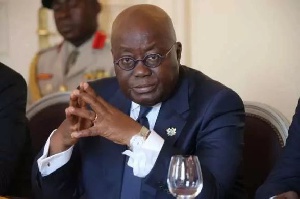 President Nana Addo Dankwa Akufo-Addo
President Nana Addo Dankwa Akufo-Addo
Information from impeccable sources inside the Office of the President leaked to the Daily Statesman in the past few hours suggests that the Energy Ministry’s solo-driven revised deal with the Dubai-based energy equipment provider AMERI will not see the light of day.
It is emerging that President Akufo-Addo was misled into granting executive approval for the deal under the guise of there being an urgent need to have a bill laid in Parliament before its rising.
Under the proposal, the Greece-based Mytilineos International Trading Company was to assume management responsibility for the AMERI emergency power-generation arrangement negotiated by the past NDC government, in effect extending the original outsourcing agreement by ten years.
On his return to Accra on Tuesday from the 53rd session of the ECOWAS Heads of State meeting in Togo, the President quickly requested and received a further briefing on the new deal. This revealed that the agreement to which he had given approval on July 31 lacked the requisite input from the Attorney General and the Ministry of Finance. The President had been misled to believe that both departments had assessed the deal thoroughly.
We are also hearing that the Economic Management Team met on Tuesday to discuss the revised deal for the first time and the outcome was that it is not in Ghana’s interest. We are further informed that the new AMERI arrangement will be one of the critical items for discussion at cabinet later today. There are clear indications that cabinet will “kill” the deal.
In the run-up to the 2016 elections, the NPP campaigned on a promise to revise the $510 million AMERI deal, championed by President John Mahama in 2015, because the cost was unreasonably high and the arrangement riddled with corruption. As such, it was thought that, barring outright cancellation, any revision of the existing agreement would necessarily lead to a reduction in the contract sum and the cost of power within the five-year tenure.
On Thursday, July 26 the government had sought to lay a revised agreement from the Energy Ministry before Parliament, but members from both sides of the House opposed it and registered cause for the proposal to be withdrawn for further consideration.
The history of AMERI in Ghana, and particularly its association with Ghana’s energy needs, has been embroiled in controversy. The company was earning $150m as commission on the original deal just for playing the role of middleman, a provision generally considered as outrageous.
From AMERI Energy to AMERI Equipment to METKA, which is said to be a subsidiary of Mytilineos, the deal is being owned and run by the same group of people, who keep re-emerging under different names. The new proposal by the Ministry of Energy is for Mytilineos to assume ownership from METKA. Critics have described this as one company handing over responsibility to itself.
In a funeral tribute to the late Ghanaian lawyer and businessman Ekow Awoonor published in 2014, Ibrahim Mahama, the entrepreneur and brother of the former president, said: “Our business associates worldwide were notified of Ekow’s demise and it will surprise you to know that minutes after receiving their mails, persons including Ivan Glasenberg, the CEO of Glencore Xstrata, the largest commodity trader in the world, Dimitrios Platis, director of the Mytilineos Group, the largest integrated aluminum company in the EU, [and] Paul Smith of METKA Limited, an EPC [engineering procurement construction] contracting firm in Greece, immediately called…”
A committee from the Ministry of Energy assigned to look into the old AMERI deal had recommended that the agreement be renegotiated or abrogated if AMERI was not amenable. It is inexplicable how a revised deal should be leading to an increased cost burden on the state.
Under the proposed deal, Ghana is to make annual payments of $75m for 15 years: under the existing arrangement, the nation is contracted to pay $102m for five years. The Africa Centre for Energy Policy think tank has observed that the AMERI plant will have an efficiency level not exceeding 20 per cent of its capacity beyond 2019. This raises doubts why Ghana should maintain the arrangement beyond the tenure of the present five-year contract.
There has been public outcry against the proposal since details of the deal emerged when the Energy Ministry attempted to have it laid before Parliament.